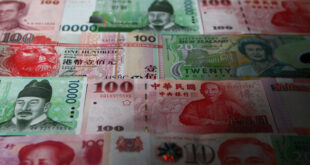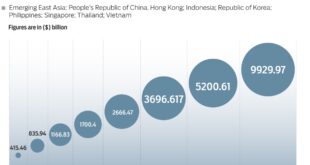SINGAPORE: The Malaysian ringgit led gains in emerging Asian currencies on Thursday, with most regional units set to see monthly rises as risk appetite improved after a relatively smooth sale of Italy’s bonds and on strong U.S. business spending.
The ringgit rose as investors rushed to cover short positions, shrugging off news that central bank was set to impose tighter rules on the currency’s reference rates. The Indonesian rupiah gained on continuous capital inflows, while the South Korean won gained on stop-loss dollar selling by offshore funds.
Such gains helped most emerging Asian currencies see monthly gains.
“Sentiment improved on healthy U.S. data and Bernanke’s support. So, emerging Asian currencies are expected to gain a bit further next month,” said Jeong My-young, Samsung Futures’ research head in Seoul, referring to comments this week from Federal Reserve Chairman Ben Bernanke.
Bernanke reaffirmed his commitment to the Fed’s stimulus efforts.
“Italy and U.S. spending cuts could pose some risks. But the impact of Europe’s political problems on Asia are limited. I don’t think U.S. politicians will not reach an agreement,” Jeong added.
The Italian election at the weekend offered no party a majority and markets had been concerned about the country’s finances, as well as a revival of the euro zone’s debt crisis.
But Rome on Wednesday sold all 6.5 billion euros of 5- and 10-year bonds offered to investors.
Most emerging Asian currencies reported a positive month in February on capital inflows to the region.
The won led the monthly gains with a 0.6 percent rise against the dollar, according to the Thomson Reuters data.
During the last two weeks, market players increased long positions in the won, Reuters poll showed earlier. The ringgit has gained 0.5 percent for the month and the Thai baht has advanced 0.3 percent, the data showed. The rupiah has also appreciated 0.3 percent, which would be its largest monthly percentage gain since January last year, according to the data. RINGGIT The ringgit touched 3.0865 per dollar, its strongest since Feb. 14, as improving global risk appetite intensified short-covering.
Investors largely ignored news that the central bank will tighten rules on the fixing of onshore reference rates for the ringgit and has asked the Malaysian Forex Association to increase the number of banks contributing to the ringgit reference rates to 15 from 11 previously, two sources told Reuters.
The plans are unlikely to have an impact on currency market flows, traders said.
The Malaysian currency strengthened past a 200-day moving average at 3.0940, causing expectations for more gains.
“We could see a move back towards 3.0830 if Asian strength continues,” said Maybank in a note.
The local unit has been under pressure as political uncertainty builds ahead of the upcoming general election, which must be called by the end of April.
Some traders say election risks have already been well priced into the market, but domestic banks sold the ringgit on rallies, limiting its upside.
But local investors stayed cautious over the political event.
“That is a huge factor. The date of the election has not been announced yet,” said a Malaysian bank trader in Kuala Lumpur. – Reuters
 Asia Finance News Asia finance news, banking, market analysis, business, Forex, trade, Cryptocurrency as it is happening in Asia. Trusted gateway for Asian financial news.
Asia Finance News Asia finance news, banking, market analysis, business, Forex, trade, Cryptocurrency as it is happening in Asia. Trusted gateway for Asian financial news.





